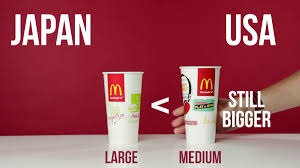Japan is widely considered one of the healthiest countries in the world, with one of the highest life expectancy rates (84 years, versus 78 in the U.S.). And while their older population should make them more vulnerable, Japan also has the fewest deaths, by far, due to Covid-19 when compared to other G7 countries: only 18 deaths per million (compared to over 1,000 per million in the U.S.).
While many experts believe cultural factors such as a homogenous society; no handshaking or hugs; and pre-existing use of masks have contributed to Japanese success against COVID-19, their population’s extraordinary health is also an important factor. As the Economist reports:
“Although the population of Japan is disproportionally elderly, and therefore potentially more vulnerable to Covid-19, it is also very healthy. Only 4.2% of Japanese adults are obese, a condition known to make the disease more lethal. That is the lowest rate in the OECD and one-tenth of America’s.”
Gyms aren’t as common in Japan as they are in the U.S., and the Japanese smoke and drink more than Americans. So how do they stay so healthy? I had the opportunity to live in Japan years ago, and can point to several cultural norms that we can learn from the Japanese to improve our health.
Focus on Health
In Japanese, the equivalent of “How are you?” is the phrase “Genki desuka?” This translates to “Are you healthy?” Imagine if you were asked about your health numerous times a day; wouldn’t that keep it top-of-mind?
For those of you old enough, you might remember the movie “Gung Ho” with Michael Keaton, where a U.S. car plant is acquired by a Japanese company. In the movie, the new Japanese owners unsuccessfully attempt to implement a morning exercise routine that they do in Japan. Japanese companies still value exercise and give their employees exercise breaks throughout the day.
Key Takeaway: Make health part of your daily discussion. Ask others about their health and what you can do to support them. And think about ways that you can implement healthy practices in your workplace or community.
Value Quality, Not Quantity
The Japanese are infamous for having high quality standards, and this includes their food. It’s virtually impossible to find low-quality food in Japan, even at McDonalds! The “bento” is a traditional Japanese meal that epitomizes the focus on quality over quantity. With high quality standards comes increased prices, as fresh fruit, vegetables and meats are notoriously expensive in Japan; however, high prices helps limit consumption and waste.
Key Takeaway: Resist the urge to “super-size” and focus on smaller quantities of higher-quality foods. Don’t be afraid to indulge in foods high in fat and protein, such as meats, cheese, nuts and avocados, which will help you feel “full” and avoid overeating.
Pro-tip: Eat at local restaurants that use local ingredients, and avoid fast-food and chain restaurants.
Eat Fresh Foods
While you can find a variety of pre-packaged foods in Japan, the Japanese emphasize home-cooked meals and fresh foods. It was typical for me to eat a salad at breakfast. Below is a picture of a traditional Japanese breakfast which typically includes fish, rice, miso soup, eggs and vegetables. This looks a lot healthier than a stack of pancakes covered with syrup and a side of bacon, right?
Key Takeaway: Focus on whole foods. You should have a serving of fresh fruit and/or vegetables at each meal. Even if you don’t have time to cook, make sure you always have some fresh fruit and vegetables on hand to supplement.
Pro-tip: Become a Community Supported Agriculture (CSA) member or get a weekly fruit and vegetable subscription to ensure you always have fresh fruit and vegetables on hand.
Walk and Bike More
Walking, biking and public transportation are the main forms of transportation in Japan, and they have one of the best public transportation systems in the world. (It helps when owning a car, parking and taxis are incredibly expensive.) Even if you are taking public transportation in Japan, you typically have a decent walk to and from your destinations, along with any transfers.
Key Takeaway: Before calling Uber or driving, see if walking, biking or public transportation is a feasible option. Not only will it improve your health, but you’ll save some money and the environment.
Portion Control
The Japanese have a phrase “hara hachi bun me,” which translates to “eat to you are 80% full.” This term originated in Okinawa and has been credited with the extraordinary health of Okinawans. Portions in Japan are much smaller than in the U.S., and we Americans constantly felt “hungry” when eating out. Perhaps it was not that the portions were too small, but rather, that our portions are too big! High food prices in Japan also help them to limit portion sizes.
Key Takeaway: Eating until you are 80% full is a simple yet highly effective way to control calories and lose weight. No calorie-counting or dieting is needed. Try it for a week, and you’ll notice a huge difference in the amount you consume and how you feel.
Pro-tip: Try using smaller dishes, which will help you limit portion sizes. When eating out, considering sharing your food.
McDonalds Drink Comparison
In American, our health is deteriorating; we reached an all-time high in obesity rates in 2020 at over 42%. Not only does this make us more susceptible to illness, such as heart disease and COVID-19, but it also takes a significant toll on our economy, as healthcare costs continue to rise. To improve our health, we need cultural changes that emphasize regular exercise and healthy eating habits. This can only happen with support from the government, businesses and communities.
What changes can you make to create a healthier society?

